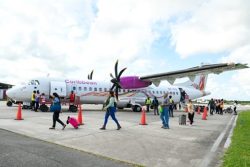Cabinet yesterday decided that the Value-Added Tax (VAT) would remain applicable to private school tuition fees for the current school year but that the measure will be reviewed in the preparation for next year’s national budget, Minister of Education Dr Rupert Roopnaraine said yesterday.
Private education became subject to VAT on February 1 as a measure of the 2017 national budget. However, there has been public outcry against the measure, including pro-tests organised by private schools.
Yesterday’s decision, though not surprising based on earlier comments by government officials, is likely to be a source of disappointment for the hundreds of parents and students, who have vehemently denounced the measure and who even went as far as to walk out of a recent meeting with ministers. The walkout was a response to Prime Minister Moses Nagamootoo’s announcement that there was unlikely to be any change this year to the application of the VAT on private school tuition fees.
Nagamootoo’s statement came at the end of a nearly three-hour-long meeting at the National Cultural Centre during which operators and students of private schools took the time to voice their concerns to government ministers about the impact the measure will have on their education.
During the meeting, accountant Christopher Ram called out the government on its continued request for the private schools to absorb VAT rather than pass it on to the students.
According to Ram, government is asking the schools to accept a 12.28% cut in their gross revenue when government is not prepared to accept less than a quarter percent (0.25%) of a cut in its tax revenue.
He said that a better option for earning needed tax revenue is to pursue those entities, including private schools, which are evading taxes.
“There are laws to deal with those persons and those laws must be implemented. There should be no reason, therefore, no reason that tax not paid by schools should be charged to the consumer,” he told the ministers gathered.
University of Guyana Lecturer Dr Mellissa Ifill, contributing to the debate as a parent, told the ministers that her research has shown that while other Carib-bean and South American countries also have a private and public model of the education system, none of them have a system where private tuition is taxed. Instead, in several territories, governments provide tax exemptions and even go so far as to pay the salaries of teachers working in private schools because they recognise that the sector is providing a necessary service.
She assured that her opposition to the budget measure will not end until its revocation.
While the meeting ended with a walkout, Director of School of the Nations Dr Brian O’Toole said that it was a useful venture. It was the students of this school who launched the first organised opposition to the measure, with the launch of a petition calling for its repeal. That petition, which was able to garner more than 14,000 votes, was submitted to the Presi-dent as well as the ministers of Education and Finance.





